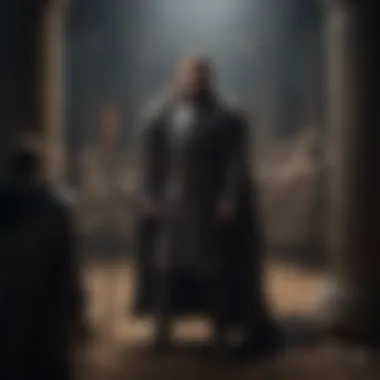Exploring Lordship in the Game of Thrones Universe


Intro
The intricate tapestry of lordship in the universe of Game of Thrones weaves together power, duty, and the often treacherous waters of loyalty. Westeros is not merely a backdrop for conflict; it is a living entity shaped by the ambitions of its lords and ladies. From the noble houses that vie for the Iron Throne to the feudal responsibilities that bind them, every character's journey plays a significant role in the political landscape. This narrative embarks on a profound exploration of lordship, focusing on how authority is exercised in a world rife with moral dilemmas and personal betrayals.
Character Dissections
Detailed analysis of key characters in Game of Thrones
Key figures in Game of Thrones, such as Eddard Stark, Cersei Lannister, and Daenerys Targaryen, embody the complexities of lordship. Eddard's unwavering commitment to honor starkly contrasts with Cersei's ruthless pragmatism. Each character's decisions resonate beyond mere personal motivations, echoing throughout Westeros.
- Eddard Stark: He embodies the ideal of honor, but his downfall suggests that rigid adherence to such principles can be fatal in a deceitful world.
- Cersei Lannister: Her journey illustrates a calculated use of power, prioritizing family legacy over morality, reflecting the survival instinct common among the nobility.
- Daenerys Targaryen: Her evolution from an exiled princess to a formidable queen raises questions about the cost of authority and the burden it carries.
Character development throughout the series
Throughout the series, characters undergo significant transformations that often blur the lines between heroism and villainy. Take Jaime Lannister, for instance. Initially portrayed as a contemptible character, his gradual redemption arc complicates perceptions of loyalty and honor.
- Jon Snow: His journey from the Wall to eventual leadership illustrates the struggle of identity amidst the expectations of lordship. He questions the very tenets of loyalty ingrained in him, challenging the status quo of Westeros politics.
Impact on the overarching storyline
The decisions made by these characters do not merely affect their fates; they shape the narrative itself. Witness how Tyrion Lannister’s clever manipulations sway allegiances, or how Sansa Stark’s evolution into a shrewd leader shifts the dynamics of power.
"In the world of Game of Thrones, every choice is monumental, affecting both the immediate and distant future of Westeros."
Episode Breakdowns
Recap of significant events in each episode
Each episode of Game of Thrones serves as a reflection of its characters' struggles with lordship. From the opening scene of the first episode to the climactic battles of later seasons, pivotal moments are laden with implications regarding loyalty and power.
Exploration of themes and symbolism
Themes such as betrayal, trust, and the ramifications of absolute power permeate the series. The Iron Throne itself symbolizes the ultimate prize of lordship, with each character's quest for it resembling a twisted game of chess where every piece can become a pawn.
Key moments and their implications
- The Red Wedding stands out as a key moment of betrayal that exemplifies the perilous nature of alliances in Westeros.
- Jon Snow’s decision to ally with the free folk highlights the moral complexities faced by those in power, challenging traditional feudal bonds.
Lore Explorations
Delving into the rich history and lore of Westeros
To understand lordship, it is crucial to delve into the history and lore that informs character decisions and conflicts. The fall of House Targaryen, the ancient rivalries between the Starks and Lannisters, and the mystique of the White Walkers all serve as foundational elements of the story.
Uncovering hidden details and connections
The lore is replete with details that enrich our understanding of character motivations. For instance, the complexities of the Stark family tree often shed light on Ned’s sense of honor and duty in the face of overwhelming odds.
Exploring the cultural and mythical aspects of the world
Cultural traditions, like the Night's Watch oaths or the meanings of the sigils of each house, infuse the narrative with depth, offering insights into the responsibilities that come with lordship.
Fan Theories
Compilation of popular and intriguing fan theories
The realm of Game of Thrones has sparked numerous fan theories about character fates and hidden motives. Some speculate that Jon Snow may be destined to unite Westeros under a new banner, challenging traditional narratives.
Evaluation of theories based on evidence from the show
Evaluating these theories often reveals a mixture of solid grounding in the series’ events and pure speculation. For example, theories surrounding the return of certain characters or shifts in allegiance reflect the unpredictable nature of power.
Speculation on future plot developments
As the show progresses and continues to evolve beyond the books, the potential directions for these character arcs and their implications for lordship in Westeros present endless discussion points, ensuring that the politics of this world will always remain relevant.
Understanding Lordship
The concept of lordship is at the heart of the sociopolitical structure depicted in the Game of Thrones universe. It reflects a complex web of authority, loyalty, and obligation, shaping the interactions not just between the characters, but also the very landscape of Westeros. Understanding lordship is crucial for appreciating the motivations, conflicts, and decisions made by various characters throughout the narrative. As fans, we find ourselves drawn into the often bloody dance of power, where the price of ambition is steep and alliances are as fragile as the delicate lives of those who inhabit this world.


Definition and Importance
At its core, lordship refers to the power and authority a noble possesses over their fiefdom and vassals. It signifies not just a title, but a set of responsibilities. A lord is expected to provide protection, uphold justice, and govern the lands entrusted to them. The importance of this role cannot be overstated—each decision made by a lord reverberates through the lives of the common folk and nobles alike. It creates a ripple effect that influences the overall dynamics of power in Westeros.
Understanding the intricacies of lordship can illuminate character motivations and plot developments. For instance, when Eddard Stark bewails honor, it’s grounded in his understanding of what it means to be a lord. His commitment to fairness and duty contrasts sharply with characters like Cersei Lannister, who manipulates her position for personal gain. This dramatic interplay emphasizes how differing perceptions of lordship can lead to both loyalty and betrayal.
Historical Context
Feudal System in Westeros
The feudal system is the backbone of social organization in Game of Thrones. Lords are the apex of this system, holding sway over lands that have been passed down through generations. This system fosters a sense of obligation: lords need to provide sustenance and protection to those who live on their land, while peasants owe them loyalty and tribute. Key to this system is vassalage, where lesser lords support a more powerful one in exchange for protection.
The feudal structure is advantageous in that it creates a layer of loyalty forged through necessity. This intention is clear when one examines the ways in which alliances are formed—often through marriage or blood oaths. However, the feudal system also harbors significant drawbacks, such as the potential for abuses of power. Lords like Stannis Baratheon showcase both the honor and peril of such authority, as his unwavering sense of duty can lead to devastating consequences for those around him.
Comparison with Real Historical Structures
When comparing Westeros's feudal system with historical examples, there are notable similarities. Europe's medieval societal hierarchy reflects much of the same structure—nobles, vassals, and serfs creating a framework of power that allows for both stability and violence. The Magna Carta, for instance, sought to limit the power of the king in favor of the barons, deepening the ties between lord and vassal.
In terms of disadvantages, the rigidity of a feudal contract often stifles the commons' aspirations and freedoms. Many real-world historical instances highlight the consequences of lords who overreach their bounds or prioritize personal gain over feudal duties. Just as with the situation surrounding House Stark, historical lessons echo through the storylines, revealing the perils of unchecked ambition and betrayal.
"The chains of loyalty bind as strongly as the chains of iron."
In examining these feudal structures—both fictional and historical—we gain insight into the complexities of lordship, illuminating why characters make the choices they do, and the tragic fates that often befall them. These layers of understanding deepen not only our analysis of the characters, but also the world they inhabit—a world where respect and fear often walk hand in hand.
The Role of Lords in Westeros
The concept of lordship is at the very heart of the socio-political structure in the world of Game of Thrones. Lords wield significant power and influence, serving as the backbone for the feudal system that governs the Seven Kingdoms. Within this frame, their roles extend beyond mere authority; they shape destinies, enforce laws, and maintain the delicate balance of peace and conflict that defines Westeros.
Responsibilities of a Lord
Protection and Defense
Every lord's primary duty lies in the safeguarding of their domain. Protection and defense not only encompass the physical safeguarding of one’s territory against external threats but also the wellbeing of the inhabitants under one’s rule. This responsibility carries a profound weight; failure to secure one's lands could lead to chaos and the collapse of the societal order.
One key characteristic of this duty is the obligation to raise and command an army. Whether it’s defending against wildlings from Beyond the Wall or facing the armies of rival houses, a lord must possess military knowledge and strategic acumen. This aspect is particularly beneficial as it helps the lord solidify their power through alliances and fear, ensuring that their lordship is recognized and respected.
However, the unique pressure of this responsibility can have disadvantages as well. The constant threat of warfare may lead to costly mobilization of resources, risking economic stability. Moreover, a lord known for poor military strategy might find their influence dwindling and their vassals questioning their capability.In summary, protection and defense stand as a double-edged sword; it is a critical hallmark of leadership, yet one fraught with challenges.
Justice and Governance
Equally vital is the lord's role in justice and governance. A responsible lord must administer laws that ensure order and fairness within their realm. This aspect of lordship is core to maintaining legitimacy and fostering loyalty among the populace. A lord seen as just will command respect, inspiring both admiration and submission.
A key characteristic here is the ability to adjudicate disputes, which allows a lord to establish their position as the ultimate authority in matters of law. This power empowers the lord to reinforce their place within the hierarchy of noble houses, as they are the chief arbiter of local conflicts. This is beneficial as it creates stability, but can also be a double-edged sword when the balance of justice leans toward favoritism, alienating segments of the population.
Governance demands a delicate dance between authority and empathy. A lord making harsh decisions must evaluate the consequences of their actions. This aspect brings to light the precarious nature of rule, where a single judgment could alter the course of alliances and the lord’s standing in the intricate tapestry of Westerosi politics.
Noble Houses and Their Influence
House Stark
House Stark emerges as a prime example of lordship embodying unwavering principles. Located in the North, they bear the heavy mantle of responsibility with solemnity, emphasizing honor and integrity. Their famous motto, “Winter is Coming,” is a reminder of their readiness for adversity and their strong sense of duty.
The key emphasis here is the embodiment of justice in their governance. House Stark's reputation for fairness is crucial; it distinguishes them as lords who protect the commonfolk and enforce the law without bias. Such characteristics make them a moral beacon in a corrupt world, garnering deep loyalty from their bannermen and the people.
Nevertheless, this idealistic approach can sometimes be a double-edged sword. The rigidity of their principles may lead to vulnerability in the ruthless political landscape of Westeros, where expediency often trumps morality.
House Lannister
In stark contrast stands House Lannister, renowned not just for wealth but for their shrewd manipulation of power. Their motto, “Hear Me Roar!”, captures the essence of their bold aspirations to dominate through calculated schemes. Lord Tywin Lannister epitomizes this blend of ambition and intelligence.
The Lannisters are particularly adept at leveraging their resources. Their wealth provides not only military strength but also the means to forge alliances and sway loyalties, allowing them to exert influence far beyond their immediate territory. This characteristic of cunning governance is particularly appealing in an unpredictable political environment.
However, while power through wealth seems a strong position, the Lannisters demonstrate that reliance on manipulation can backfire. Their propensity for deceit often breeds distrust among allies and adversaries alike, which can swiftly shift public perception against them.
Through the lens of both House Stark and House Lannister, a clearer picture of the complexities involved in lordship within Westeros emerges. Lords' roles in protecting their realms and delivering justice are tightly interwoven with their ability to influence and interact with their noble counterparts in this deadly game of thrones.
Power Dynamics Among Lords
Understanding the power dynamics among lords is crucial when exploring the intricate political landscape of Westeros. This realm, dances on the strings of loyalties, betrayals, and manipulations that shape the very foundation of lordship. The interplay of power among various noble houses serves not only to represent the feudal system but also influences the fates of characters and the storyline itself. It brings to light how shifts in alliances or rivalries can alter the realms and provide context to the motivations behind each lord's actions.
In this section, two main aspects dominate the narrative: allegiances and rivalries, alongside the dramatic effects war has on lordship, emphasizing how these factors mold the authority and legitimacy of the noble houses.


Allegiances and Rivalries
The relationships between lords can be seen as a web of delicate strings holding the realm together. Lordship is often tested in the arena of allegiance. Many lords, like Ned Stark, align themselves according to honor and ancestral connections, while others, like Cersei Lannister, maneuver through a landscape marked by deception and ambition. Each house has its unique way of forging and maintaining alliances, which can shift as quickly as the seasons in Westeros.
The rivalries that arise, often fueled by historical grievances or resource competition, can lead to devastating consequences. For instance, the animosity between House Stark and House Lannister remains a pivotal element that influences decisions and conflicts throughout the series. This tension not only highlights the conflicts of interest but also adds depth to the characters involved, presenting a rich tapestry of motivations that drive them.
The Impact of War on Lordship
War is the crucible that tests lordship and reveals the true nature of power dynamics among lords. The impact of war on lordship extends beyond just physical conflict; it influences the fabric of society in Westeros, challenging traditional allegiances and creating new hierarchies.
The War of the Five Kings
When one speaks of the War of the Five Kings, one cannot overlook how this conflict epitomizes the chaos that arises from the lust for power. Multiple claimants to the throne, combined with strategic maneuverings by various houses, underscore the fragility of alliances. It's characterized by brutal skirmishes, betrayals, and the ever-changing landscape of loyalty.
The War of the Five Kings serves as a crucial lens through which we can view the nature of lordship, reflecting how wars exacerbate rivalries and alter loyalties, often for self-serving reasons. This period demonstrates that in the game of thrones, mercy is often hard to come by, and many lords must make decisions that challenge their moral compasses. The unique feature of this war highlights the depth of character development as lords grapple with their sense of honor against their need for survival.
Consequences of the Targaryen Restoration
The Targaryen Restoration illustrates another facet of how conflict and power plays shift the dynamics of lordship. When Daenerys Targaryen begins her quest to reclaim the Iron Throne, the consequence of her actions ripples through Westeros. The restoration not only resurrects old legacies but also causes many lords to reevaluate their allegiances. Houses that once thrived under a different regime now face the prospect of shifting power back toward the Targaryens — presenting them with stark choices.
This restoration brings forth the question of loyalty, as many lords must decide whether to embrace the new order or act in defense of the status quo. The unique aspect of the Targaryen Restoration lies in how it complicates existing rivalries, causing once-united houses to fracture under pressure. As conflicts escalate, the intertwining of fate and ambition results in a landscape drenched in conflict and betrayal.
In summary, the power dynamics among lords in Game of Thrones serve as a crucial framework for understanding the interplay of authority and control. Through allegiances, rivalries, and the impact of war, we glimpse the intricate dance of power that defines lordship and shapes the narrative arc of this captivating universe.
Key Characters and Their Lordships
In the complex world of Game of Thrones, lordship is not merely a title but a heavy mantle that comes with myriad consequences and expectations. This section examines how pivotal characters embody the varied facets of lordship, offering insights into their distinctive qualities and actions. Through their individual journeys, we see how honor, ambition, and cunning can shape not only their legacies but also the very fabric of Westeros itself. Understanding these characters provides a clearer lens through which to view the political dynamics and moral ambiguities that define the series.
Eddard Stark: Honor and Duty
Eddard Stark stands as a paragon of honor in a realm often swayed by treachery. As the Lord of Winterfell and Warden of the North, he symbolizes a commitment to duty, loyalty, and justice. Stark’s strong moral compass sets him apart in a world that often favors betrayal over integrity. He believes in the weight of responsibility that comes with his title—a conviction that drives him to make tough decisions. Whether it’s executing a deserter from the Night’s Watch or choosing to honor his vow to support King Robert, Stark’s actions paint a portrait of a man burdened yet steadfast in his sense of what is right.
However, Stark’s rigid adherence to honor ultimately proves to be his undoing. His inability to navigate the labyrinthine politics of King’s Landing fosters opportunities for his enemies. His famous motto, "The man who passes the sentence should swing the sword," emphasizes personal responsibility, yet highlights the stark consequences of his convictions.
Here we see not just a lord, but a tragic hero whose choices echo throughout the seven kingdoms.
Cersei Lannister: Power and Manipulation
In stark contrast to Stark, Cersei Lannister embodies the darker side of lordship, wielding power with a masterful touch of manipulation. As the daughter of Tywin Lannister and the wife of King Robert Baratheon, Cersei's ascent in the ruthless court of Westeros illustrates her cunning intellect and relentless ambition.
She is not one to play by the rules of honor. Instead, Cersei capitalizes on the flaws of others, using their weaknesses to her advantage. Whether plotting against her husband or scheming against rivals, she sees every interaction as a chess match where the ends often justify the means. Cersei's machinations result in significant power shifts, showcasing her as a driving force in political upheaval. Even as the consequences of her actions spiral out of control, her tenacity reveals the lengths one might go for power.
Her infamous quote, "When you play the game of thrones, you win or you die," summarizes her worldview. Cersei illustrates that in the realm of lordship, morality often takes a back seat to ambition.
Petyr Baelish: Ambition and Betrayal
Petyr Baelish, also known as Littlefinger, is a character who encapsulates the notion of ambition intertwined with betrayal. Starting as a minor player in the hierarchy of Westeros, Baelish rises through the ranks employing a unique blend of charm and deceit. His portrayal is an intricate dance of manipulation where every alliance is fleeting, and trust is a luxury he seldom affords.
Baelish’s philosophy centers around his belief that chaos brings opportunity. His famous line, "Chaos isn't a pit. Chaos is a ladder," reflects his view that instability can be harnessed to climb towards power. This perspective drives him to orchestrate events like the instigation of conflict between the Stark and Lannister houses, revealing his proficiency in the art of deception.
Despite his ambitious strides, Baelish serves as a warning of the vulnerabilities inherent in lordship rooted in betrayal. His ambition leads to a web of consequences, causing irrevocable damage to those around him, including himself. His intricate games make one question the cost of such ambition and where loyalty truly lies.
"The man who can’t handle their power in such a world risks losing everything."
By studying the trajectories of characters like Eddard Stark, Cersei Lannister, and Petyr Baelish, we discover the multifaceted nature of lordship in Game of Thrones. Each character offers a unique lens into the structure of power, where honor, manipulation, and ambition converge, revealing deeper truths about leadership in a world fraught with peril.
The Concept of Loyalty
Loyalty in the Game of Thrones universe isn't just a casual sentiment; it's the bedrock of relationships and alliances. In the world of Westeros, where power shifts like the wind and the stakes are as high as a dragon's flight, loyalty shapes the narrative woven through the lives of characters. It draws lines between friends and foes, births wars, and brings about profound transformations in the realm's political fabric.
Understanding the dynamics of loyalty reveals how it affects individuals’ choices and the overarching storyline. Lords and commoners alike often find themselves at crossroads, compelled to choose between allegiance to their house or their own personal morals. Some may prioritize their kin above all, steering their destinies toward survival and prosperity for their bloodline. Conversely, others may struggle with the weight of their beliefs, torn between the loyalty to their houses and the longing to act according to their principles. This intricate tug-of-war is essential to the exploration of lordship in the series, indicating the fragility of power and the moral dilemmas embedded in lordship.
Loyalty to House versus Personal Values
Westeros is rife with noble houses that demand absolute loyalty from their vassals. This unyielding fidelity can often clash with personal values, creating a rich vein of tension. Take, for instance, Eddard Stark, a paragon of honor, who ultimately struggles in navigating the murky waters of politics while upholding his commitment to his house. His personal belief in justice and honor stands as a poignant counterpoint to the calculated, often ruthless ambitions of other lords.
In contrast, characters like Jaime Lannister exemplify this internal conflict. Although his loyalty toward House Lannister is nearly palpable, as he exists within the confines of immense pressure and expectation, his growing bond with Brienne of Tarth challenges his previously held views. The friction between familial loyalty and individual morality unravels complex motivations, illustrating how characters oscillate between adherence to their houses and their innate sense of right or wrong.
This choice to maintain loyalty can often lead to unforeseen consequences. Cersei's willingness to betray all for the sake of her family’s supremacy is a grim reminder of the profound impact loyalty can have on the course of events. In this realm, personal values can be overshadowed by the fierce grip of house loyalty, leading characters into dark alleys they might never emerge from.


Betrayals That Alter Power Structures
Betrayals in the realm of Game of Thrones are not simply acts of treachery; rather, they act as pivotal turning points, altering the power dynamics across the land. The fabric of loyalty is as delicate as a spider's web, and one sharp cut can cause the entire structure to collapse.
The Red Wedding
The infamous Red Wedding stands out as a monumental betrayal that reshaped the political landscape of Westeros. This event underscored the capricious nature of loyalty when the Stark family was lured into a trap under the pretense of friendship and alliance. The brutal slaying of key members of House Stark not only eradicated a powerful family but also sent shockwaves through the realm. It illustrated a harsh truth: in this world, friendship can quickly turn to enmity.
This sordid affair carved the path for the rise of House Frey, augmenting their standing in the realm while simultaneously diminishing Stark influence. The Red Wedding is significant as it fuels the mental and emotionally charged revenge narrative, further emphasizing the precarious bond of loyalty that governs the realm’s allegiances.
The Fall of House Stark
The decline of House Stark, driven by betrayal and incompetence, accentuates the theme of loyalty turned sour. Various layers of treachery, especially the significantly pivotal actions of someone within their ranks, bear devastating ramifications for the Starks. Their fall serves as a cautionary tale of misplaced trust and the lurking shadows of betrayal that often envelop those who uphold honor.
Unlike the swift nature of the Red Wedding, the fall of House Stark transpired over multiple seasons, with each betrayal gradually peeling away the strength of their house. The consequences were not simply confined to the Stark lineage but rippled through the entire realm, demonstrating that loyalty has the power to sustain or ruin destinies.
In both circumstances, loyalty—whether upheld or betrayed—determines the rise and fall of houses. Through these narratives, the concept of loyalty is unraveled, revealing layers of meaning, motivation, and moral introspection that significantly shape the world of Westeros.
Morality and Ethics in Lordship
The realm of Westeros is a vivid tapestry woven with threads of power, loyalty, and the ever-present specter of morality. In the intricate structure of lordship, every choice made can have profound repercussions, and this is where the realm of ethics comes into play. Understanding the moral landscape that governs the actions of lords is essential not only to grasp the narrative arc of Game of Thrones, but also to appreciate the tragic beauty of its characters’ struggles. Morality and ethics in lordship function as the guiding stars amidst the chaos of power plays and betrayals.
The Burden of Leadership
Being a lord is not simply a title; it’s a weight that can crush the spirit of even the noblest of men. Lords are expected to uphold their oaths, protect their people, and make decisions that can alter the course of history. This burden of responsibility is a double-edged sword. On one hand, the decisions made by a lord can lead to peace and prosperity, whereas on the other, they can plunge their domain into despair.
Take Eddard Stark, for instance. His commitment to honor and integrity during his tenure as Warden of the North illustrates this burden sharply. Stark’s unwavering adherence to his moral compass led him to make choices that often put him at odds with the ruthless nature of court politics in King’s Landing. The paradox lies in the fact that while his ethical stance was admirable, it ultimately cost him dearly.
A lord’s moral decisions can create ripples throughout their domain, influencing everything from military alliances to public perception. It’s not just about wielding power; it’s about the legacy they leave behind. The ethical considerations faced by a lord shape not only their own fate but also the fates of countless others.
Choices with Grave Consequences
In the world of Game of Thrones, choices do not merely carry weight; they are often laden with grave consequences that echo through generations. The moral quandaries that lords face become defining moments that challenge their integrity and influence the fate of their houses.
Justice Served or Vengeance?
At the heart of these choices lies the distinction between justice and vengeance. This theme resonates through various plotlines, encapsulating the struggles faced by characters like Cersei Lannister. After the death of her children, her desire for vengeance spark a cycle of hatred that ultimately devours her. This dichotomy is not just a moral lesson; it shapes the narrative trajectory.
Justice is heralded as a noble pursuit, offering a glimmer of hope in a dark world. But it can be easily distorted into the guise of vengeance. The line between these two concepts is dangerously thin in Westeros. The pursuit of vengeance often blinds characters to the broader consequences of their actions, leading to a downward spiral of retaliation and chaos.
The Dilemma of Power
When examining the moral complexities within lordship, one cannot overlook the dilemma of power. This dilemma manifests itself in the choices made by characters like Petyr Baelish. Baelish embodies the notion that power, while intoxicating, can corrupt absolutely. His manipulations are strategic, often leaving moral dust in their wake.
Power often presents a seductive choice, leading lords to justify morally questionable actions that serve their interests. The role of power pressures them into making decisions that may align with their ambition but conflict with ethical standards. This internal conflict creates tragic narratives that keep readers captivated.
The unique characteristic of this dilemma lies in its complexity. Characters are often caught between the desire to maintain their power and the necessity to act justly. The advantages of navigating this dilemma lie in the potential for personal growth and the forging of alliances, while the disadvantages can lead to isolation and the eventual fall from grace.
"In the game of thrones, you win or you die. There is no middle ground." — Cersei Lannister
Future of Lordship in Westeros
The notion of lordship in Westeros is not a stagnant concept, but rather one that ebbs and flows with the tides of history and power. As the series unfolds, the future of lordship takes on a new significance, particularly in light of the ongoing upheaval and shifting allegiances among the noble houses. Understanding these dynamics is crucial for grasping how the political landscape of the realm will evolve. In this section, we will explore the emerging houses, new power dynamics, and the ongoing transformation of nobility in a setting rife with conflict and change.
Emerging Houses and New Power Dynamics
As the dust settles from the catastrophic wars and the remnants of once great houses, new players are beginning to carve out their own places in Westeros. Houses that were once on the fringes of power, like House Tully or House Martell, are gaining traction while others like House Baratheon are waning. This emergence leads to a reconsideration of loyalties that may force the old guard to reassess their positions.
- House Tully: Their reclamation of influence through connections in the Riverlands highlights a shift where historical rivalries may begin to blend into new alliances.
- House Martell: With their distinct cultural identity and fresh strategies, the Martells are striving to reestablish themselves not just as a house of vengeance, but as key political players in the future of Westeros.
The delicate balance of power is shifting, and with it comes a reevaluation of traditional lordship. Power dynamics are no longer just based on familial ties but also on alliances, trade agreements, and even marriages, adding layers to how houses might interact moving forward.
Moreover, the rise of common folk and their influence in politics challenge the status quo. The acknowledgment of the people's voice, spurred by leaders like Daenerys Targaryen, infuses a new perspective on lordship. This integration signifies a potential reshaping of authority where lords need to consider the will and welfare of the populace.
"While the old ways die hard, the future demands adaptation and evolution in the roles of those who wield power."
Redefining Nobility in a Changing Landscape
The definition of nobility is increasingly being scrutinized as Westeros adapts to a world marked by constant change. Lordship is moving beyond mere titles and bloodlines; it encompasses qualities of resilience, adaptability, and the ability to engage with the complexities of a modern political landscape.
New characters, such as Sansa Stark, embody this transformation. As she grows from a sheltered noble into a leader who considers the needs of her people, her actions begin to symbolize a broader trend towards leader accountability. Here are a few aspects that showcase this shift:
- Accountability: Nobles are becoming more answerable to the public, recognizing that their decisions reverberate through communities.
- Inclusivity: A more inclusive approach in governance is emerging, where different voices—historically marginalized—are getting a seat at the table.
- Moral Compass: The moral obligations of leaders now weigh heavily as they navigate the choices that affect not only their houses but the realm as a whole.
As the landscape of lordship continues to be shaped by these elements, the question looms: Will traditional concepts of power hold true, or will the transformative nature of current events lead to a drastically new establishment?
As the future unfolds, the ongoing shifts will undoubtedly define the evolution of lordship, echoing the sentiments of both the powerful and the once-forgotten voices across Westeros.



